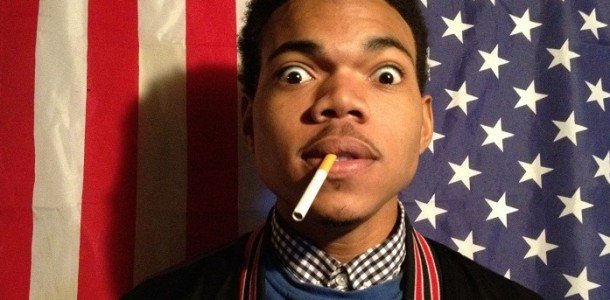“Everybody in this room is lucky to be alive right now.” At the end of “Pusha Man,” the writhing, meditative gem at the center of Acid Rap with a heart as broken as Son House probing the ‘Murder Season’ phenomenon of Chicago summer, Chance the Rapper left the silent, brimming crowd at The Metro with this memento mori kids on the South Side shoulder every day like a backpack. I came into this show and watched from the balcony expecting a juke bacchanal celebrating the ascension of the city’s next son, which happened, but I didn’t expect the substance-addled fervor of a sold-out Saturday night to stare me in the face with an old man’s lucidity and tell me for some, life is a luxury. I wanted to cry.
I can’t tell you how many times I’ve been to The Metro in the past 10 years, but on Chance The Rapper’s sold-out debutante weekend, it was different. An electric gravity poured out of the eyes and open mouths of the teenage legions swarming every square inch and seeped into the banisters and columns lining the concert hall. The effect reminded me of a dimmed United Center waiting for Rose to stride out of the tunnel. When Chance strode on stage to the war call of a chant of his name, it was hard to tell the difference.
Since Acid Rap dropped a little shy of a month ago from the date of the show, Chance’s unhinged, feral expression splayed over the album art has darted into the collective consciousness of the music scene in Chicago and infected hype into media outlets and fans alike with the viciousness of a viral outbreak. He’s really something of an anomaly in recent Chicago rap: intense but not nihilistic like Chief Keef, inventive but more probing than The Cool Kids (Mikey Rocks, aka Sir Michael Rocks, opened up the show), and referential to Chicago music tradition but not self-absorbed like Hollywood Holt and Murder Club (whatever happened to him?). The look on his face on the album cover and in concert says not even he knows what to do with himself, and it’s that comportment that earned him this sold-out weekend.
The show was sweat, sweat, sweat, and I wasn’t even in the pit. The lotus haze-party atmosphere sidled through the writhing mass of bodies in the pit to songs like “Good Ass Intro” and “Cocoa Butter Kisses.” The amassed kinetic energy of hundreds of slippery kids juking in one swaying lake of bodies created 100 percent humidity. From my vantage the floor played out like a party down I Spy: spotting a 16-year-old fainting, figuring out which bobbing snapback produced the latest in a mobius strip of weed clouds, seeing a boyfran go for full grope on his ladyfran (some to success; others not so much). But the entire time no one was distracted; it was all on Chance.
At his most intense, I can’t think of any other comparison for him on stage than Hamlet in a soliloquy. He’s got heavy shit on his mind, and he raps like he wants you to hold onto it. It’s really in his eyes; when he’s in the middle of strangling a verse he looks like he’s conjured an invisible straw man to fill with his knives and daggers. And it stands to reason; his songs have a social element to them, with the gurgling vitriol of Chief Keef, and the honed lyricism of Common.
Even while I’m writing this and wrapping up, I’m still jarred by “Pusha Man.” The murder epidemic of the South Side has simmered on the periphery of national attention for years, and still a large bulk of the American public are unaware it common for a student there to develop PTSD or know at least one person (if they’re lucky just one) who has died as a direct result of gun violence. Since the era of Benji Wilson loose guns and unbridled violence have become subject matter for generations of Chicago rappers, and Chance is the latest to grapple with these monsters. He’s confident, he’s angry, and he wants to know where the fuck Matt Lauer is.
